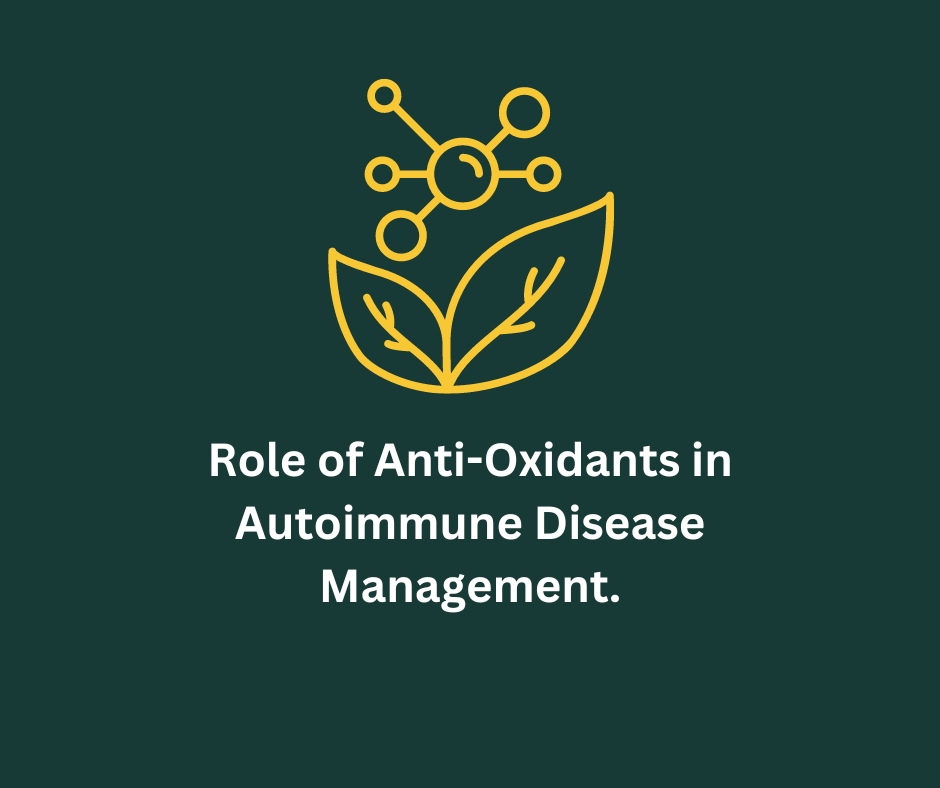Introduction
Autoimmune diseases occur when the immune system mistakenly attacks the body’s own tissues, leading to chronic inflammation and tissue damage. Oxidative stress, characterized by an imbalance between the production of reactive oxygen species (ROS) and the body’s ability to detoxify these harmful compounds, plays a significant role in the development of autoimmune diseases. This blog will explore the role of oxidative stress in autoimmune diseases, the benefits of antioxidants like vitamins C and E, selenium, and glutathione, and provide evidence-based recommendations for incorporating antioxidant-rich foods and supplements into your diet.
Oxidative Stress and Autoimmune Diseases
Oxidative stress occurs when there is an excess of ROS, such as free radicals and peroxides, in the body. These reactive molecules can damage cells, proteins, and DNA, leading to inflammation and autoimmune responses. The body’s antioxidant defense system, which includes enzymatic and non-enzymatic antioxidants, works to neutralize ROS and maintain cellular balance.
Oxidative Stress in Autoimmune Diseases
Multiple Sclerosis (MS)
In Multiple Sclerosis, oxidative stress contributes to the deterioration of myelin, the protective covering of nerve fibers, leading to neurodegeneration. Studies have indicated that patients with MS exhibit higher levels of oxidative stress markers and lower levels of antioxidants.
Rheumatoid Arthritis (RA)
Rheumatoid Arthritis is characterized by chronic joint inflammation. Elevated oxidative stress is linked to joint damage and inflammation in RA patients. Research has shown a correlation between oxidative stress markers and disease activity in individuals with RA.
Systemic Lupus Erythematosus (SLE)
Systemic Lupus Erythematosus is an autoimmune disease that affects multiple organs. Oxidative stress plays a crucial role in the disease’s progression, with studies showing increased oxidative damage and reduced antioxidant defense in SLE patients.
Benefits of Antioxidants in Autoimmune Diseases
Antioxidants are molecules that neutralize ROS and protect the body from oxidative damage. Several antioxidants have shown promise in managing autoimmune diseases:
Vitamin C
Vitamin C, also known as ascorbic acid, is a powerful antioxidant that scavenges free radicals and regenerates other antioxidants like vitamin E. It also plays a role in collagen synthesis and immune function.
Immune Modulation
Vitamin C supports the function of various immune cells, including neutrophils, lymphocytes, and phagocytes, helping to modulate the immune response.
Clinical Studies
A study published in Immunopharmacology and Immunotoxicology found that vitamin C supplementation reduced oxidative stress and improved immune function in patients with SLE.
Vitamin E
Vitamin E, or tocopherol, is a lipid-soluble antioxidant that protects cell membranes from oxidative damage.
Anti-Inflammatory Effects
Vitamin E has anti-inflammatory properties, reducing the production of pro-inflammatory cytokines in the body.
Clinical Evidence
Research published in Rheumatology International demonstrated that vitamin E supplementation improved clinical symptoms and reduced oxidative stress markers in patients with RA.
Selenium
Selenium is a trace mineral that is a component of several antioxidant enzymes, including glutathione peroxidase.
Immune Function
Selenium is essential for optimal immune function and helps regulate the production of ROS.
Research Findings
A study in The Journal of Nutrition showed that selenium supplementation improved antioxidant status and reduced disease activity in patients with SLE.
Glutathione
Glutathione is a tripeptide and a master antioxidant that plays a critical role in cellular detoxification and immune function.
Redox Balance
Glutathione helps maintain the redox balance within cells and is involved in the regeneration of other antioxidants.
Therapeutic Potential
Research published in Autoimmunity Reviews suggests that enhancing glutathione levels may help reduce oxidative stress and inflammation in autoimmune diseases.
Evidence-Based Recommendations for Antioxidant-Rich Foods and Supplements
Dietary Sources of Antioxidants
Incorporating antioxidant-rich foods into your diet can support your overall health and help manage autoimmune diseases:
Fruits and Vegetables
Fruits and vegetables like citrus fruits, berries, kiwi, bell peppers, spinach, and kale are excellent sources of vitamins C and E, as well as other antioxidants.
Nuts and Seeds
Nuts and seeds, such as almonds, sunflower seeds, and walnuts, are rich in vitamin E and selenium.
Whole Grains
Whole grains like brown rice, oats, and quinoa provide selenium and other antioxidants.
Lean Proteins
Lean proteins, including fish and poultry, supply selenium and support overall health.
Supplementation Protocols
For those considering supplements, here are some guidelines:
Vitamin C
The recommended daily intake for vitamin C is 75-90 mg for adults, with higher doses (up to 2000 mg/day) under medical supervision for therapeutic use.
Vitamin E
The recommended daily intake for vitamin E is 15 mg for adults. Therapeutic doses ranging from 400-800 IU/day may be used to manage oxidative stress in autoimmune diseases.
Selenium
The recommended daily intake for selenium is 55 mcg for adults. Supplementation doses typically range from 100-200 mcg/day.
Glutathione
While direct glutathione supplementation is available, boosting endogenous glutathione levels through N-acetylcysteine (NAC) or alpha-lipoic acid (ALA) supplements may be more effective. Recommended doses are NAC (600-1200 mg/day) and ALA (300-600 mg/day).
Conclusion
Oxidative stress plays a significant role in the development of autoimmune diseases, contributing to inflammation and tissue damage. Antioxidants such as vitamins C and E, selenium, and glutathione have shown promise in reducing oxidative stress and improving immune function in autoimmune conditions. By incorporating antioxidant-rich foods into your diet and considering evidence-based supplementation, individuals with autoimmune diseases can potentially improve their symptoms and overall health.
Better possibilities now exist for managing chronic pain, autoimmune diseases, and lifestyle diseases more holistically and naturally. Guidance from Cure4Pain Clinic India can be sought for autoimmune disease management.
To learn more about how Vitamin D & Co-factors therapy can help manage autoimmune diseases like Psoriasis, Lupus, Hashimoto’s Thyroiditis, Rheumatoid Arthritis, etc., you can watch this video: Watch Video.
References
- Fischer, M. T., et al. (2012). Cytotoxicity of oxidative stress for oligodendrocytes is mediated through the plasma membrane of their cell processes. Nature Neuroscience, 15(10), 1424-1433.
- Mateen, S., et al. (2016). Increased reactive oxygen species formation and oxidative stress in rheumatoid arthritis. PLOS ONE, 11(4), e0152925.
- Tewthanom, K., et al. (2008). Serum vitamin C and serum uric acid levels in patients with systemic lupus erythematosus. Immunopharmacology and Immunotoxicology, 30(4), 711-718.
- Pacht, E. R., et al. (1997). Vitamin E decreases chronic inflammation and improves lung function in cystic fibrosis. American Journal of Respiratory and Critical Care Medicine, 156(3 Pt 1), 750-755.
- Kumar, P., et al. (2014). Selenium supplementation in the critically ill: A meta-analysis. Critical Care Medicine, 42(9), 2237-2248.
- Wu, G., Fang, Y. Z., Yang, S., Lupton, J. R., & Turner, N. D. (2004). Glutathione metabolism and its implications for health. The Journal of Nutrition, 134(3), 489-492.
- Hemilä, H. (2017). Vitamin C and infections. Nutrients, 9(4), 339.
- Meydani, S. N., et al. (1991). Vitamin E supplementation enhances cell-mediated immunity in healthy elderly subjects. The American Journal of Clinical Nutrition, 53(3), 736-742.
- Fairweather-Tait, S. J., et al. (2011). Selenium in human health and disease. Antioxidants & Redox Signaling, 14(7), 1337-1383.
- De Rosa, V., et al. (2019). Glutathione and the regulation of immune responses: Beyond an antioxidant. Frontiers in Immunology, 10, 1669.


